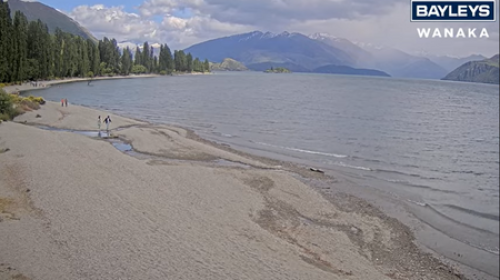Otago Weekly Fishing Report - 7 December 2023
- Otago
- 7/12/2023
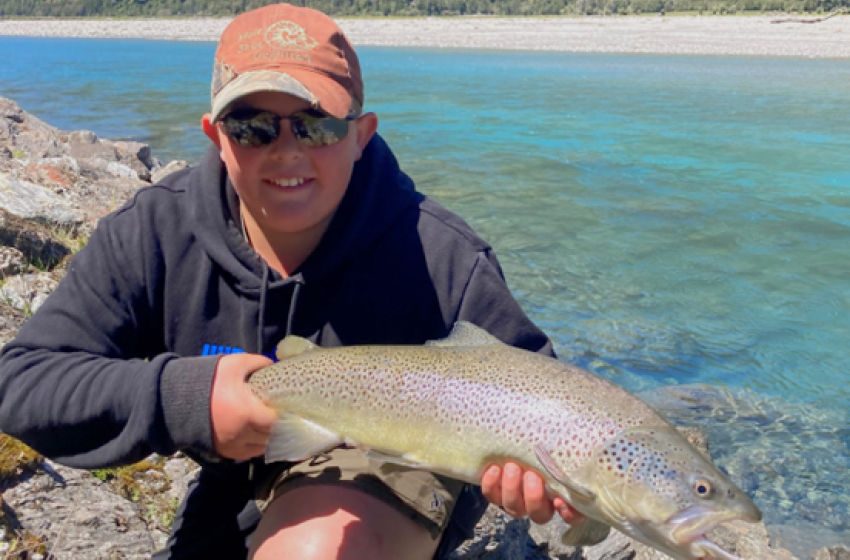
Above: Riley Anderson (13) with a stunning-conditioned brown trout caught in the Wilkin River, one of Otago’s nine Designated Water fisheries. Photo: Riley Anderson.
Gone fishing with the wind
A strong north-westerly is forecast across Otago on Saturday and anglers will need to adapt or look for sheltered areas for the best fishing. Change your approach with heavier lures, flies or tactics to combat this.
Wind will push food onto the downwind shore. If casting into the wind and waves, keep your casts low and flat and punch hard. Or look for food concentrated along foam lines and use the wind coming from across and behind to your advantage.
Take extra care if considering boating.
Most rivers have been clear this week but may rise and discolour as heavy rain and showers are forecast in coming days.
Care for your catch

Ice packs like the ones in this photo are a great substitute for ice and can be reused many times in this case to keep a tasty Hāwea salmon chilled. Credit: Ben Sowry.
Temperatures are rising often into the mid-20s in inland areas. With fat trout and abundant salmon in many lakes and rivers, anglers are starting to stock up on fish for festive season dishes.
If taking a fish for the table, the eating quality will improve greatly by following a few simple steps:
- Fight fish quickly and use a landing net to secure the catch. Long fights can cause a build-up of lactic acid in the fish’s blood. This will acidify the flesh and start to break down the proteins, making for poorer table fare.
Similarly, if you choose to release the fish, a shorter fight time will greatly increase its survival rate. - Immediately dispatch the fish, either by a knife spike to the brain, or a swift blow with a sturdy object to the head. After killing the fish, immediately bleed the fish. This is best done by cutting the throat behind the gills.
- Once the fish has bled out after a minute or so, place the fish in a chilly bin or insulated bag, with ice. Instead of buying ice for every trip, fill soft drink bottles with water and freeze them.
The rule of iced versus no iced fish is one hour to one day: a fish not on ice will break down in an hour as much as a fish on ice will break down in a day. So, if you’ve been fishing for six hours with a fish not on ice, its eating quality would be similar to a fish that has been on ice for nearly a week.
By looking after the fish from the second it takes the hook, you’re investing in the quality of your meal.
Tussock lake levels high

Jayde Couper with a typical-sized Lake Onslow brown trout, which took a nymph suspended below a strike indicator. Credit: Bruce Quirey.
Water is lapping the grassy edges of Lake Onslow and Loganburn Dam this week, offering great fishing conditions at these tussock reservoirs.
Spin anglers should explore the edges with small lures or soft baits before casting out wide, as trout will often be feeding near the edge, especially as the high level is providing extra food.
This week at Lake Onslow, small brown trout took various fly-fishing methods, including a nymph suspended below a strike indicator, a black and red woolly bugger, and a foam-head streamer retrieved just above the bottom with a sinking fly line. There were midge swarms but few fish rising, suggesting trout would also be feeding on larvae and pupae. Blood worm flies and buzzers imitate these midge stages.
Trolling can produce excellent results at both lakes, especially when there is a light breeze rippling the water.
Onslow has a large population of brown trout averaging 1kg. Loganburn Dam trout are renowned for their eating quality and average about 1-2kg. Both reservoirs offer the occasional larger fish.
Large lakes producing

Two tasty school-sized Hāwea salmon, caught chasing a 14 gram hex wobbler from the Hāwea lakefront. Credit: Mason Court.
Stevenson Arm on Lake Wānaka has been fishing well for rainbows, says Mark from Southern Wild, with customers and friends reporting solid catches of well-conditioned fish. Most of these fish have been caught trolling with the use of a downrigger or lead line to get the lures down to about 7-10 metres deep.
Mark recommends chopping and changing different-coloured lures during the day to find out what is working best. Some of his top picks for Lake Wānaka are the traffic light Tasmanian Devil, Daiwa Pink Chinook spoon and Zebra Toby.
Lake Hāwea is still producing good numbers of tasty salmon from the shore.It is important to have the correctly weighted lure to ensure that you can cast far enough to reach the school, as they often sit on the limit of casting range.
Mark encourages anglers to ensure that they give their lure enough time to sink and don’t retrieve too fast, in order to maximise the time their lure is at the right depth among the salmon. Recommended lures include hex wobblers, spoons and other 14-20 gram spinners.
Win with #ReWild
Calling all fishing enthusiasts!
Get your cameras ready as Fish & Game NZ is launching its ReWild Snap’n’Share photo competition, running from December 1 to March 31, with $2000 worth in prizes from Kilwell Sports up for grabs.
Capture the beauty of sports fishing in New Zealand and submit your best photo on the ReWild campaign website. Share it on socials and tag us #ReWildSnap.
There are four separate monthly competitions over December, January, February and March. Each month, the best photo will win a $250 Kilwell Sports voucher, and the monthly winners will become finalists for the ultimate prize. The finalists will go to a public vote on Facebook and the winner will receive an additional $1000 from our generous sponsor Kilwell Sports.
Get creative, showcase your skills and don’t miss your chance to be a part of the #ReWild campaign. The winning photo will be featured on the front of the 2024-2025 fishing licence.
Follow the link below to enter. Please read the full terms and conditions and make sure your photo complies with the competition rules. Good luck!
Lake Wānaka live webcam
Want to know conditions at Lake Wānaka? Check this live webcam from the Wānaka water sports facility.
Dunedin

Finding somewhere to escape the wind this weekend will be key for anglers, with a strong wind watch in place from noon-9pm on Saturday. Strong northerlies are forecast on Saturday before easing to gentler westerlies in the evening. On Sunday fresh southwesterlies are forecast to cause a drop in air temperature before shifting to the northwest later in the day.
The Taieri River at Outram was flowing at 5.46 cumecs. The water temperature was 17℃.
Click here for live weather updates.
Wānaka
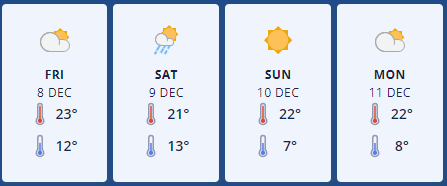
Wānaka has a mixed forecast this weekend with a heavy rain and wind watch from noon - 9pm on Saturday. Anglers are urged to take care as rivers may rise fast with the heavy rain. The weather is forecast to calm somewhat with clear skies and southerlies easing in the evening.
Click here for live weather updates.
Alexandra
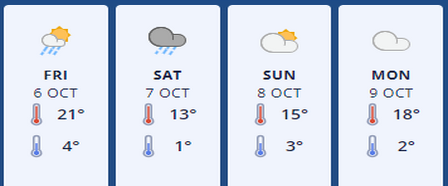
Alexandra, like the entire Otago region, has a strong wind watch from noon–9pm on Saturday. Clear skies are forecast for the whole weekend. Saturday’s wind is forecast to come from the north-west. On Sunday the wind shifts to fresh southerlies.
Click here for live weather updates.
Clutha Regional Forecast
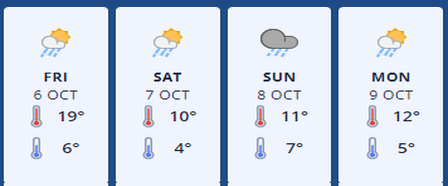
Saturday is forecast to be mostly cloudy, with showers developing in the evening. There is a strong wind watch with north-westerlies. Sunday is forecast to bring isolated showers which will clear in the evening with fresh westerlies.
The Pomahaka River flow is currently sitting at 6.9 cumecs.
The lower Clutha River at Balclutha is at 618 cumecs.
Click here for live weather updates.
Getting started
Need a fishing licence? Go online here, and let the angling adventures begin.
Got any Otago fishing news?
Send your fishing news and photos (with anglers’ names) to [email protected] for consideration in the weekly report. If photographing a fish to be released, hold the fish over water and make it quick – the fish should not be out of the water for more than five seconds.
Tight lines,
Otago Fish & Game
